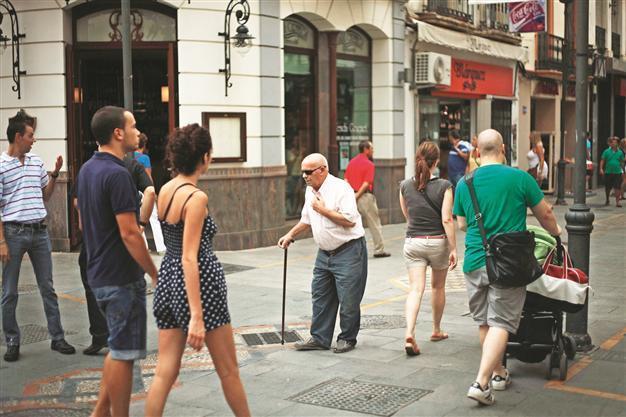Spain mulls pensions freeze, 1 million people wait for aid
MADRID - Reuters

A pensioner walks with his cane along La Bola street in Ronda, near Malaga. The retired people in Spain are suffering the negative effects of the ongoing crisis. REUTERS photo
Spain is considering freezing pensions and speeding up a planned rise in the retirement age as it races to cut spending and meet conditions of an expected international sovereign aid package, sources with knowledge of the matter said, Reuters reported on Sept. 21.The measures would save at least 4 billion euros a year as well as fulfill recommendations in a European Union document released in May which senior euro zone sources said was being used as a blueprint for the terms of a sovereign aid program.
The acceleration of the raising of retirement age to 67 from 65, currently scheduled to take place over 15 years, is a done deal, the sources said. The elimination of an inflation-linked annual pension hike is still being considered.
Spain, the new epicenter of the eurozone debt crisis after Greece, Ireland and Portugal, is hesitating to apply for external aid to handle a high public deficit and soaring debt. Its borrowing costs fell on Sept. 20 at an auction of a 10-year benchmark bond but relief may be short-lived.
New budget on the way
The new pensions steps, which could be announced as soon as next week along with the 2013 budget, would send a strong signal to investors that Spain is serious about implementing structural reforms it has delayed because of the political cost.
Spanish Prime Minister Mariano Rajoy, who was forced earlier this year to break campaign pledges such as not raising taxes, repeatedly said he would not touch pensions, but he has few options left to trim the budget after drastic cost cuts.
He toned down his language last week and said it would be “the last thing” he would do. Earlier this week, Deputy Prime Minister Soraya Saenz de Santamaria said the government was not implementing any cut on the pensions “for the time being”.
Sources with knowledge of the government’s thinking said Rajoy’s comments were a sign that his stance was shifting.
“He just said that he would not cut the pensions. But did you hear anything else? We both know that there are several ways of cutting. One is to simply leave them steady against inflation,” said one of the sources.
A second source said the acceleration in the change in the retirement age was backed by the government while a third source, who discussed the issue with senior Spanish officials, said a freeze was expected.
“Not increasing them is also an adjustment,” the third source said.
Many economists also believe a freeze is inevitable.
The 2012 budget earmarks a 1 percent inflation review - or about 1 billion euros - but inflation is running close to 3 percent, meaning an extra 4 billion euros that would be paid to pensioners in January but booked to the 2012 budget.
The number of impoverished people seeking aid from charity Caritas in Spain tripled between 2007 and 2011 and has topped a million, it said on Sept. 20, reflecting the impact of the financial crisis.
The number of people who asked for aid from Caritas, which organizes food handouts to the poor, rose from 370,000 in 2007, before the worst of the crisis erupted, to 1.01 million last year, Caritas said in a report.
Many people have lost their jobs -- the unemployment rate is near 25 percent -- and many have also come to the end of their unemployment benefits or had them reduced as part of the government’s emergency cuts, Agence France-Presse quoted Caritas as saying. Official figures show there are more than 1.7 million families in Spain in which all working-age members are out of work. Between 2007 and 2011 Caritas said the biggest rise in demand was for food, clothing and housing.
















